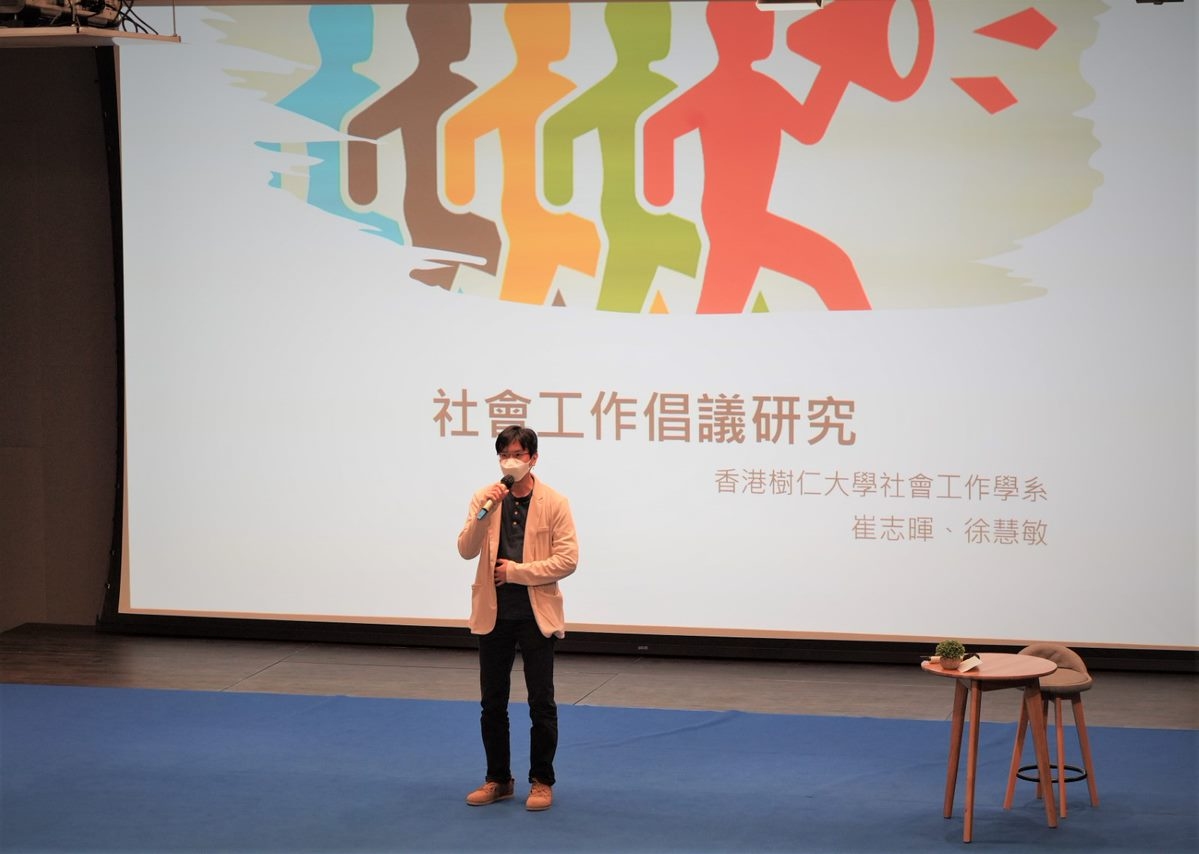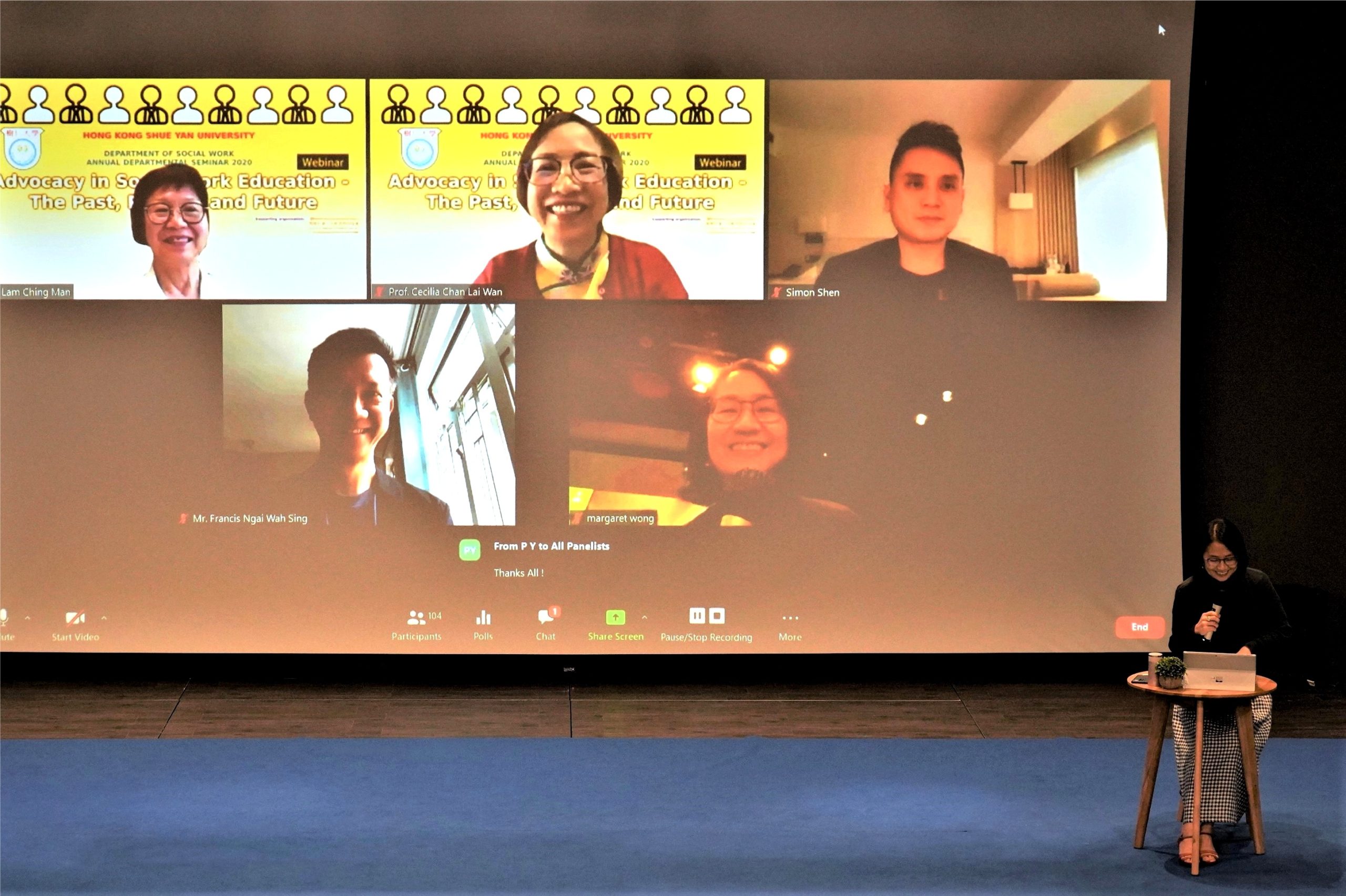The live webinar on Oct 23 morning, titled “Advocacy in Social Work Education: the Past, Present and Future” was organized by the Department of Social Work at Hong Kong Shue Yan University (HKSYU) as its annual seminar. This online event offered a good opportunity for HKSYU faculty, students and invited general public to join Professor Cecilia CHAN, Professor Simon SHEN, Professor Ching-man LAM and Mr. Francis NGAI to discuss the meanings, significance and development of advocacy, now and then.
Dr. Margaret WONG, Head of Department of Social Work at HKSYU, believes that for advocacy to create positive impact on individuals and society, an interactive platform has to be established to encourage dialogue across diverse groups with multiple perspectives. The current economic challenges and political dilemma, deems advocacy the more important, as snow-melting agents in severe winter.
Hope to see things change – top reason for participating in advocacy

Speaking at the seminar, Dr. Raymond CHUI of the Department released the result of a survey conducting in early 2020 on Social Work Advocacy, which involved 158 social workers and social work students. The results of the survey indicated that the respondents’ knowledge of advocacy ranges from intermediate to high levels. The social issues they concerned most, which they have advocated or intended to do so, include “Freedom, Rights and Democracy”, “Social Conflict”, “Poverty” and “Mental health and Stigmatization”. The top three reasons for participating in advocacy in descending order are: (1) Hope to see things change; (2) Personal value orientation; and (3) Professional responsibility. (See table)
Advocacy activities attended by social workers most include: (i) arranging or ensuring the service-users to acquire the opportunity to receive service; (ii) providing or ensuring service-users to obtain their own personal data; and (iii) ensuring service-users’ and carers’ points of views will be considered during the actual provision of service.
Social workers believe that the relatively effective ways of doing advocacy are to start from service-users’ points of view, “ensuring they can acquire relevant services and information” as well as “giving them timely guidance”.

Collaborative mindset, social innovation and embracing hope
Professor Cecilia CHAN, Emeritus Professor of Department of Social Work and Social Administration, at the University of Hong Kong, looks back to the past and points out that practicing advocacy has never been a rivalry between friends and foes. “The results can be very different if social workers could change the I in the word illness to We. It will turn into ‘we-llness’, i.e. wellness. Less dispute, more love; more forgiveness and more understanding are important ingredients in our mindsets when advocating. Promoting peace, harmony, balance and love in advocacy is my wish.” She said.
Driving new values with service users is not only achieved by a mindset change, creativity also plays an important role. Mr. Francis NGAI, the founder and CEO of Social Ventures Hong Kong, used a series of recent innovative social projects and local initiatives as examples to talk about the successful ways of solving current or predictable future problems. He emphasized that diversified thinking is itself a catalyst for effective advocacy.
Professor Simon SHEN, an international relations specialist and Adjunct Associate Professor of the Faculty of Social Sciences at the Chinese University of Hong Kong, said that despite the present and future implications of the fourth Industrial revolution and “Ubernization”, the social work profession has an indispensable role to play still in human connections. The profession has to be engaged in proactive reflection to consolidate its uniqueness. He also encouraged seminar participants to work for a better social change through advocacy, with his inspiring words: “No matter what our society will look like, we must not lose hope”.
Professor Ching-man LAM, Adjunct Professor of Department of Social Work at the Chinese University of Hong Kong, echoed the positive mindset of all the guest speakers by articulating how collaboration and innovative thinking can create values together with our service users in advocacy, as well as rekindling our wishes “to see positive change in things”. To summarize the main tasks of social work advocacy education in future, the roundtable discussion suggests that we have to develop a better way to understand the changes in various industries, and find out the greatest common factor for multiple collaborations among all sectors to inspire strategies for sustainable social development. This may be one of the keys for doing successful advocacy.
Source: November 2020 Issue
